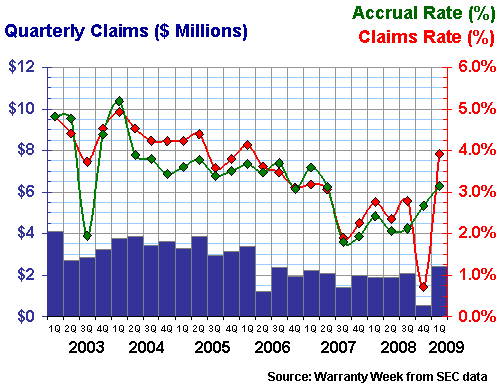Lifetime Warranties:
Companies are free to define a lifetime any way they wish, but they have to be clear about their rules and their exclusions. Some issue the warranty to just the first owner of the product. Others qualify it with words such as reasonable or useful. And some high-tech companies spell out a policy under which the warranty's lifetime will end after sales cease and spare parts run out.
Longer warranties have become a competitive weapon in numerous industries, and so-called lifetime warranties have taken those durations to their logical limits. Ten days ago, Extreme Networks Inc. announced it would cover the low end of its data network equipment product line with lifetime warranties, coupled with next-day hardware replacements and technical support services.
That offering matched the lifetime warranty package Hewlett-Packard Co. has provided for its ProCurve network switch product line since 1998, which in turn surpasses the coverage that market leader Cisco Systems Inc. provides for its data networking product line.
The question is simple: what's a lifetime? Is it the lifetime of the business? The lifetime of the owner? Or is the lifetime something else: a period that's not exactly defined but is probably so lengthy that a product is expected to either wear out or become obsolete long before it becomes defective?
Paul Wojcicki, an attorney and shareholder with Segal McCambridge Singer & Mahoney Ltd., said the Magnuson-Moss Warranty Act, which establishes warranty rules at the U.S. federal level, designates all written warranties as either "full" or "limited." A "full" lifetime warranty would be one that says a product will be repaired or replaced forever, no matter who owns it or how it was broken. There would be no limit on the number of repair attempts for a recurring problem. It would place no limitations on payments for incidental or consequential damages such as loss of use or travel expenses. It also would place no duration on any implied warranties of merchantability or the fitness of a product for a particular purpose.
Suffice it to say that there are very few "full" lifetime warranties out there. At the very least, most companies will want to deny claims that result from abuse or accidents. So while they're limiting that aspect of the guarantee, they might as well also try to limit the duration of the warranty to some reasonable period shorter than the lifetime of the planet.
Whose Lifetime Is It?
"The key question is, what do we mean by lifetime?" Wojcicki said he can't think of a product that will last forever, so there always has to be some limit on its guarantee. If the warranty isn't transferable to a second owner, it's effectively limited by the lifetime of the original buyer. If it is transferable, then it would still be limited by the useful life of the product itself. Or the warranty could be limited to a certain number of years after the product line is taken off the market. Or it could be explicitly limited to some "reasonable" or "useful" lifespan, as long as it's explicitly detailed or defined in the warranty's terms and conditions.
Wojcicki said he thinks the failure pattern for digital products is different than it used to be for purely mechanical products such as vehicles. With items such as data switches and routers, there are likely to be a lot of defects discovered right out of the box or soon after initial use begins. But then the failures taper off drastically. And because there are so few moving parts (except perhaps the disk drives), the product doesn't wear out like a mechanical system. So if it works for two weeks, two years is likely and two decades is possible. And the cost of a 90-day warranty isn't going to be all that different from the cost of a limited lifetime warranty.
"I think it reflects marketing," Wojcicki said. A 90-day warranty suggests disposability. A lifetime warranty suggests longevity, reliability, and quality. "The use of the term lifetime is sexy. But I think it also reflects that with advances in technology, products are lasting longer. We are able to get more useful life out of them. And as usable life increases, the risk of extending warranties out for longer periods of time decreases."
Greg Cross, public relations manager at Extreme Networks, said the company is offering a "lifetime warranty" on its Summit fixed edge switches and ReachNXT Ethernet port extender that's limited in several ways. First, the warranty is limited to the original purchaser. And second, it is limited in duration by the date on which the company ultimately chooses to discontinue supporting the product line. And while that date is uncertain at this point in time, the methodology that will be used to determine it is clearly spelled out in an annex to the warranty's terms and conditions.
End-of-Life Countdown
As with any product line, Extreme Networks will at some point in the future stop selling the Summit and ReachNXT products that are covered by this lifetime warranty. That defines first milestone, the "end-of-sale" date, which in turn starts the clock for the end of warranty support. Five years after the "end-of-sale" date comes the "end-of-support" date, which is also the end of the lifetime warranties. Therefore, because the product is for sale today, the lifetime of the warranty is going to be at least five years. If it's still for sale in 2010, the warranties will last until at least 2015. And so on.
The Summit X150 Series, the X250e Series, the X350 Series, and the X450e Series are all covered by the limited lifetime warranty, as long as they were manufactured and shipped after June 29. Other units in the family, including the Summit X450a models as well as the higher-end Summit X650 models, the WM100, WM200, and the WM2000, and the Summit48si model, are covered by a one-year warranty. The ReachNXT 100-8t gets the lifetime coverage. But the entire Alpine, Black Diamond, and Sentriant product families are covered by just the one-year warranty.
Cross said the typical lifespan of a low-end Ethernet switch is around five years. Some companies choose a more aggressive three-year replacement schedule, but five years is typical. After that, the product is probably going to be obsolete, thanks to the higher speeds and enhanced features that are expected to be available on newer units. "So five years is probably a good rule of thumb," he said.
So why not simply provide a five-year warranty? Why call it a limited lifetime warranty if it's unrealistic to expect the product to still be useful after five years?
Cross said customers want the flexibility to keep these switches in use longer if they want, rather than feeling rushed to replace them simply because the warranty is running out. The whole idea of these low-end switches is to install them at the remote edges of a network and forget about them until they need replacing. By giving them a warranty that covers them until they need replacing, Extreme Networks is giving the network manager one less thing to worry about.
So covering the switches with a long warranty is somewhat reassuring. If they fail, they'll be repaired or replaced under warranty. If they don't fail, they will stay put until they become obsolete. But at no point would they require repairs for which the customer has to pay (unless they're damaged by abuse or accident, etc.).
Lifetime Just at the Low End
The rest of the Extreme Networks product line is covered by one-year warranties. Usually, it's the high end that gets the best warranties, so the customer feels they're buying the best quality and getting the best support for the extra money. But in this case, because of competitive pressures, it's the low-end of the product line that get the longer warranties, reassuring the customer that repairs won't cost money.
"Right now, it's the switches that are on the lower end that are getting this treatment," Cross said. "It's decided by market dynamics. It's partly a response to the competitors that we have, and what is trending in the market at any given time. And so, what we've announced makes us most competitive."
Cross said there are no plans at this time to expand the limited lifetime policy to the entire product line. "We're happy with what it is now," he said.
Hewlett-Packard, meanwhile, has a long list of ProCurve Networking gear that's covered by limited lifetime warranties. But some units have only one-year warranties, which can be supplemented by the purchase of HP ProCurve Care Packs. And within some of those units with lifetime warranties, just the disk drives are covered by five-year warranties.
Extreme Networks also sells service contracts to supplement its less-than-lifetime warranties, and sometimes to also supplement certain aspects of the lifetime plans. For instance, the limited lifetime warranty provides next-day replacements. For a fee, the customer can purchase four-hour same-day response times. The limited lifetime plan provides technical support services from 8am to 5pm on weekdays. For a fee, customers can purchase 24x7x365 coverage.
Driving Down Warranty Costs
Fortunately for Extreme Networks, the company seems to have gotten its warranty costs under control in recent years, after having set aside as much as 5% of revenue to pay claims in 2003 and 2004. In the fourth calendar quarter of 2008, Extreme Networks paid out only $524,000 in claims on $72.6 million in revenue, for an 0.7% claims rate. But that proved to be an anomaly. In the first calendar quarter of 2009, the company returned to a more normal $2.43 million quarterly warranty payout, though because of product revenue declines the claims rate jumped to 3.9%.
Extreme Networks Inc.
Warranty Claims & Accrual Rates, 2003-2009
(in dollars and as a percentage of product sales)

Of course, lifetime warranties won't be cost-free for the company. But at least the lifetime warranties are new and won't even begin to show up in elevated accrual levels until the third calendar quarter of 2009. At this point it's uncertain how the longer warranty coverage will affect costs. But it's possible that claims and accrual rates might jump back up to the levels they reached in 2003 and 2004.
It's also uncertain how the longer warranties will affect revenue. Let's say, for instance, that the old switches were normally replaced every three years. Perhaps these new switches are made so well that there won't be any additional repairs required in years four or five. But by merely postponing replacements from every third year to every fifth year, sales revenue falls, and therefore the accrual rate rises anyway.
The nightmare scenario for any sales department would be a full and fully-transferable lifetime warranty that covers anything but willful destruction. Something basic and sturdy like a hammer or a screwdriver could be handed down from one generation to the next, sold and resold, never wearing out and never discarded, and always repaired or replaced.
Claims for Clunkers
For an electronics company such as Extreme Networks, the safety valve that prevents this from happening is the inevitable advance of technology that makes the product obsolete, combined with the non-transferability of the unit to a second owner. But in the car business, fifty-year-old vehicles in mint condition are something of a status symbol.
It's fairly common for car companies that dare to issue lengthy warranties to limit their coverage to just the first owner, and to add some requirements for maintenance, inspections, or record-keeping. Chrysler Motors LLC, for instance, issues its lifetime powertrain warranty to just the first registered owner or lessee of the vehicle. Subsequent owners, even if they are within the same family or business, are not eligible. And even current owners must allow a dealer to inspect their powertrains every five years (give or take 60 days) in order to keep the warranty valid. [Editor's note: On August 19, Chrysler said it will drop lifetime powertrain warranties beginning with 2010 model year vehicles.]
Still, some vehicle owners do live long and prosper, and they take just as good a care of their products as they do themselves. They won't misplace their receipts or forget to get the oil changed. By now, we've all probably heard somewhat hard-to-believe stories about the guy still driving his 1958 Chevy, saving all his paperwork and collecting on lifetime guarantees made long ago. It turns out, these people really do exist.
In June, the Detroit News reported that Rachel Veitch, age 90, of Orlando FL, was still driving her yellow 1964 Mercury Comet Caliente, with 557,000 miles on the odometer and counting. Over the past 45 years, she's taken advantage of numerous lifetime warranties. "Veitch is on her seventh Midas muffler, and thank you, gentlemen, for the lifetime warranty," wrote the author of the article, reporter Neal Rubin. "She's had three sets of Sears shock absorbers, also through a lifetime warranty. And though the number seems high, she claims to have had 16 free batteries, courtesy of J.C. Penney and Firestone."
Midas Inc. and its franchise operators issue limited lifetime warranties for the brake pads, brake shoes, mufflers, shocks and struts they install. "Our lifetime guarantee is valid for as long as you own your car," the warranty policy states. And for some people, that's a very long time.
So while Rachel Veitch may be an unusual case, she's not something the actuaries couldn't have predicted as likely to happen when they were setting accrual rates 45 years ago. And it's highly possible that in the year 2054, some middle-aged former teenager in his mint condition 2007 PT Cruiser or some suburban soccer grandma in her weather-beaten 2008 Town & Country is going to pull into a Chrysler dealership looking to have some warranty work done on their transmission. As Chrysler's own explanation states, "lifetime means lifetime."
Mandatory Disclosures, Not Definitions
Attorney Christopher Karo, a member of the law firm Frost Brown Todd LLC, said that in terms of U.S. warranty law, at least, there aren't any legally binding definitions of the word lifetime. Instead, the regulators at agencies such as the Federal Trade Commission have allowed companies to create their own definitions, as long as they make it clear to customers what definition they're using.
"The FTC has promulgated a rule that deals with the advertising of warranties, and it has a small section on how to properly advertise a lifetime warranty," Karo said. And while the FTC doesn't specify a minimum duration before something can be called a lifetime warranty, it does mandate that the consumer be told exactly who's or what's lifetime the warranty is tracking.
"In other words, if it's the lifecycle of the product, or if it's the ownership of the product by the individual," he said, the buyer must be told explicitly. "It's really more of a disclosure issue from the FTC's perspective. They want something that will give a rough idea to the consumer as to how long this warranty will truly last."
Extreme Networks is defining the lifetime of its warranties by linking them to the lifecycle of a specific product line. Midas and Chrysler link their lifetime warranties partly to the longevity of their customers and partly to their continued ownership of the vehicle. Each of these conditions is permissible under FTC rules, as long as they're properly explained to the buyer. But sometimes, a key phrase is left out or the wrong word is used, and the company finds itself on the hook for a perpetual guarantee they didn't intend to issue.
In a New Zealand-based publication called Reseller News, solicitor Rae Nield recently wrote how the manufacturers of a knife sold under the brand name of "Everlasting" may have inadvertently guaranteed it to last forever under terms of that country's consumer protection laws. "Under the Consumer Guarantees Act wording like that becomes an enforceable express guarantee �- a representation of the supplier or manufacturer as to the characteristics of the goods," Nield wrote in the article. "It also sets customers� expectations of the durability of the product: reasonable durability is one of the elements of the Consumer Guarantees Act guarantee of acceptable quality."
Nield, who said in a follow-up message this week to Warranty Week that her specialty is warranty law, suggested that the brand name of the knife probably also establishes an enforceable lifetime warranty in other locations such as Australia and Europe. For the U.S., she was less sure. "I would analyse it this way: the consumer is told the life is everlasting (barring actual damage etc.)," Nield wrote. "So can the consumer reasonably expect it to be everlasting?"
Lifetime Means Lifetime
Sometimes, lifetime really does mean forever. At Sears Holdings Corp., for instance, some of the Craftsman hand tools are covered by what the company calls a "Forever Lifetime Warranty." For instance, a Craftsman 154-piece mechanics tool set is described as being "guaranteed forever." So the word choice that Nield said may have created an unintended perpetual guarantee for the knife seems in this case to be the store's intended policy: This wrench and that screwdriver will last a lifetime, or we'll replace them, forever.
At Stanley Works, they're not as heavy on the "everlasting" or "forever" language, but they nevertheless issue limited lifetime warranties for most of their hand tools, "to the original purchaser for its useful life against deficiencies in material and workmanship." Exceptions include electrical or electronic components (warranted for one year), and torque wrenches (warranted for one year, except for the unit's calibration, which is warranted for 90 days). Residential locksets are warranted for as long as the original buyer occupies the home at which the product was originally installed.
To be sure, most of the Stanley product line gets a lifetime warranty, but it's limited by both the insertion of the "useful life" phrase and by the restriction in coverage to just deficiencies in materials or workmanship. The warranty explicitly "does not cover products that are improperly used, abused, altered or repaired." In addition, the company disclaims cases where the product simply wears out through normal use. So in order for a claim to be honored after 20, 30 or 40 years, it would have to be caused by a manufacturing defect that somehow failed to manifest itself for all that time.
Despite its lengthy warranties on hand tools, Stanley Works has managed to keep its warranty costs relatively low. As can be seen in the chart below, both the company's claims and accrual rates have remained very close to 0.5% for at least the past three years. The rates were actually a bit lower than that in 2004 and 2005, and only a bit higher than that in 2003.
Stanley Works
Warranty Claims & Accrual Rates, 2003-2009
(in dollars and as a percentage of product sales)

In looking at the chart, it seems that Stanley Works can easily afford to issue limited lifetime warranties for most of its product line. In fact, rates could double and Stanley would still be in a reasonable range. If it were paying out 4% or 5% of its revenue in warranty claims, one could suggest that perhaps lifetime warranties were an expensive marketing tool -- a luxury the company could not afford. But as the chart details, the company's warranty expenses have been rather predictable over the past six years (except for that one anomaly in the fourth quarter of 2003). Warranty costs have never risen above 0.7% of sales revenue, at least not since 2003.
Other Lifetimes
There are numerous other examples of limited lifetime warranties. APG Cash Drawer LLC will issue a limited lifetime warranty to buyers of its Series 4000 Cash Drawer, but only after they register the purchase with the company. Those who fail to register get only the regular five-year warranty.
Alen Corp. warrants its line of air purifiers for a lifetime. And even though the company is only four years old, CEO Peter Mann said he fully expects some of the units to last for at least 10 to 15 years. He offered the lifetime warranties as a badge of quality that reassures customers their purchases will last, despite their affordability. There's even a desktop unit, priced at $149, that comes with a lifetime warranty.Aruba Networks Inc., like Extreme Networks, warrants some of its wireless data networking gear for the lifetime of the product family, cutting off the warranties five years after the end-of-sale date. Belkin International Inc. sells its electrical surge protectors with an open-ended warranty against defects, and also provides up to $300,000 in insurance against a failure that damages any attached equipment.
The Fun Stuff
One manufacturer of headphones that targets the skateboarding demographic issues lifetime warranties without much exclusionary language. Another simply warrants them for a lifetime against getting damaged by sweat (though it excludes damage by plain old water). Several makers of CDs, DVDs, and flash memory cards warrant their products for a lifetime. But they don't cover normal wear and tear, so it's uncertain how one would proceed with a successful claim for a very old and no longer readable product. But we get the feeling that these guarantees are more about marketing and less about accruing.
Jackson Furniture Industries issues a limited lifetime product warranty for certain components of its line of Catnapper recliners. The springs, frame, and the reclining mechanism get the lifetime coverage. But the cushions are covered for only three years, and all other components get just one year of coverage. Also, although the company will supply the parts for free under warranty as long as they are available, after one year the shipping cost for those parts will have to be paid by the consumer.
We sketched out each of these different sets of terms and conditions for attorney Paul Wojcicki, and while he said some of the wording could certainly use some improvements, they all seemed to adequately disclose the way they define a lifetime and what they will and won't pay for.
"Aside from the basic statutory requirements, you can make whatever promise you want," he said. And that includes covering or not covering the shipping charges in one or both directions. There's no law that says you must, and no law that says you can't. If the cost of freight makes it difficult for the customer to cost-justify a repair on an old unit, so be it. Perhaps they'll buy a new recliner instead?
Warranty As a Competitive Weapon
"I think then it becomes more a matter of competitive strategy," Wojcicki said. The secret to success is in the language used, he suggested. Companies can't write misleading terms and conditions and expect the courts to side with them when challenged by disgruntled customers. "You can't say 'as long as you own the product,'" he said, "and then say 'but not longer than we make the product, because then your coverage is going to run out.'"
Then again, properly phrased, a clear conditional situation is perfectly permissible. Most automobile warranties, for instance, can expire either on age or on usage -- months or miles, whichever comes first. If a company were to explicitly state that it reserves the right to limit the lifetime to some finite period based upon the availability of spare parts or some other criteria, as long as that limitation was clearly indicated in the warranty at the time of purchase, it would be permissible.
"The real nub of the issue here is, when you say lifetime, what are you talking about?" Wojcicki asked. "Are you talking about the lifetime of the product? Are you talking about the lifetime of the consumer? Are you talking about reasonable lifetime?"
The big problem, Wojcicki said, is that many times the marketing departments will make these promises and write these warranties and the legal department won't see it until they're in court to defend the company. Or even if the wording is run by the legal department, the in-house counsel may not be familiar enough with the warranty-related rules of the Uniform Commercial Code or the Magnuson-Moss Warranty Act to know they may have a problem.
The irony, Wojcicki said, is that there really aren't that many statutory requirements to worry about. "You can make whatever warranty promise you want, but you can't make one that's either misleading or inherently contradictory. You can't make one that's illusory. And that's where companies can get into trouble, if they let the marketing guys run amuck, and they don't bother to talk to the lawyers."









